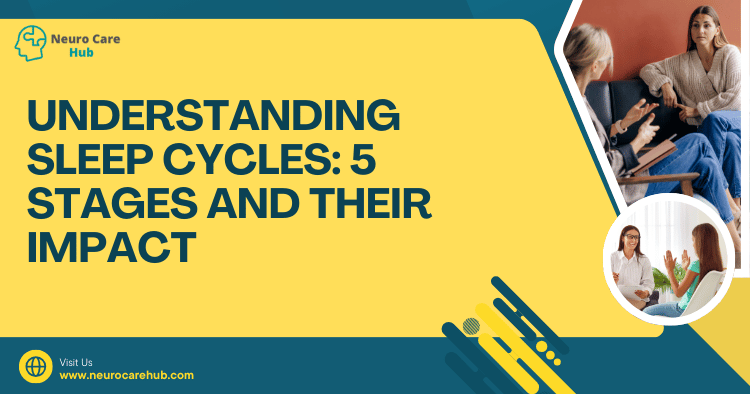Table of Contents
- What Are Sleep Cycles?
- The 5 Stages of Sleep
- The Importance of Each Sleep Stage
- How Sleep Cycles Affect Your Health
- Tips for Improving Sleep Quality
- FAQs
- Conclusion
What Are Sleep Cycles?
Sleep cycles are the recurring patterns of sleep we experience throughout the night, lasting about 90 minutes each. Each cycle includes various stages essential for physical and mental well-being. Understanding these cycles helps optimize sleep, improve mood, and enhance overall health, which is increasingly recognized as crucial in neuro care and modern medicine (source).
Did you know? The average adult spends about one-third of their life sleeping! This makes understanding sleep cycles even more important.
The 5 Stages of Sleep
Sleep is primarily categorized into Non-Rapid Eye Movement (NREM) sleep and Rapid Eye Movement (REM) sleep. Each category is further divided into stages, resulting in five distinct stages.
Stage 1: NREM Sleep
- Duration: 1-7 minutes
- Characteristics: The lightest stage of sleep, where you drift in and out and can be easily awakened. Heart rate slows, and muscles relax. Sensations of falling may occur, causing sudden awakenings.
Fun fact: In this stage, you might experience hypnic jerks, which are those sudden muscle contractions that can jolt you awake!
Stage 2: NREM Sleep
- Duration: Approximately 20 minutes per cycle
- Characteristics: Body temperature drops, and heart rate slows further. Awareness of surroundings decreases. Brain waves exhibit sleep spindles and K-complexes, critical for memory consolidation (source).
Important note: This stage accounts for about 50% of total sleep time in adults.
Stage 3: NREM Sleep
- Duration: 20-40 minutes
- Characteristics: Known as deep sleep or slow-wave sleep, this is the most restorative stage. The body repairs itself, builds bone and muscle, and strengthens the immune system. Waking from this stage can lead to grogginess.
Takeaway: Deep sleep is essential for physical recovery and overall health. Prioritize it!
Stage 4: REM Sleep
- Duration: 10-20 minutes per cycle
- Characteristics: Most dreaming occurs here. The brain is highly active, and the body experiences temporary paralysis to prevent acting out dreams. This stage is crucial for learning and emotional regulation.
Insight: REM sleep has been linked to improved memory and emotional processing. It’s more than just dreams!
Stage 5: NREM Sleep (previously categorized)
Modern understanding often includes a more nuanced view of the stages within NREM and REM sleep. Some models consider the stages fluid, with transitions varying.
The Importance of Each Sleep Stage
Each stage of sleep serves a unique purpose:
- Stage 1: Prepares the body for deeper sleep and aids transition from wakefulness.
- Stage 2: Facilitates learning and memory consolidation, essential for cognitive function.
- Stage 3: Provides deep restorative sleep, crucial for physical health and longevity.
- Stage 4: Supports emotional regulation and creativity as the brain processes experiences.
Reminder: Each stage is interconnected, contributing to a full night’s restorative sleep.
| Stage | Duration | Key Functions |
|---|---|---|
| Stage 1 | 1-7 mins | Light sleep; transition to deeper sleep |
| Stage 2 | ~20 mins | Memory consolidation; body temperature drops |
| Stage 3 | 20-40 mins | Deep restorative sleep; physical repair |
| Stage 4 | 10-20 mins | Dreaming; emotional regulation; brain activity |
How Sleep Cycles Affect Your Health
The quality of your sleep cycles directly impacts various aspects of your health, including:
- Cognitive Function: Poor sleep can impair attention, alertness, reasoning, and problem-solving. Regular neuro check-ups can help monitor cognitive health (source).
- Emotional Well-being: Disrupted sleep patterns can increase anxiety and irritability. Understanding the differences between neuro care and mental health care can be beneficial (source).
- Physical Health: Chronic sleep deprivation is linked to obesity, heart disease, and weakened immune response.
Health tip: Prioritizing quality sleep can have a profound effect on your overall health and wellness!
For more information on the health impacts of sleep, refer to resources from the National Sleep Foundation.
Tips for Improving Sleep Quality
- Maintain a Regular Sleep Schedule: Go to bed and wake up at the same time every day, including weekends.
- Create a Relaxing Bedtime Routine: Engage in calming activities like reading or meditation before bed.
- Limit Screen Time: Reduce exposure to screens at least an hour before sleep to help your body produce melatonin (source).
- Optimize Your Sleep Environment: Keep your bedroom dark, cool, and quiet. Consider a white noise machine if necessary.
- Watch Your Diet: Avoid heavy meals, caffeine, and alcohol before bedtime.
Quick tip: Consider incorporating natural sleep aids like herbal teas or essential oils to enhance relaxation.
FAQs
How many sleep cycles do we go through in a night?
Most adults complete about 4 to 6 sleep cycles each night, depending on sleep duration. Each cycle lasts roughly 90 minutes.
What happens if I don’t get enough REM sleep?
Lack of REM sleep can lead to memory issues, emotional disturbances, and an overall feeling of fatigue.
Can I train my body to need less sleep?
While some people claim to function well on less sleep, most adults require 7-9 hours for optimal health. Consistently depriving yourself of sleep can have long-term health consequences.
Fact check: Sleep is not a luxury; it’s a necessity for your health!
Conclusion
Understanding sleep cycles and their stages profoundly impacts health and well-being. Recognizing each stage’s importance and adopting practices to promote better sleep can enhance physical and mental health, leading to a happier and more productive life. For more insights on optimizing your sleep, explore resources like the Centers for Disease Control and Prevention (CDC).
Sleep well and sweet dreams! 🌙
Also look for additional insights on sleep and brain health through the resources provided in Neuro Care Hub.






